We are bombarded with information about training supplements these days, from trainers, gyms, and advertising.
And supplements are easily accessible. Trainers sell them as a side business. Gyms sell them behind the counter, or in vending machines. There is a supplement store on every corner. Your supermarket even sells protein powders.
But supplement users are often misinformed about what they are taking! Today we discuss some common misconceptions, and why our sources of information are letting us down.
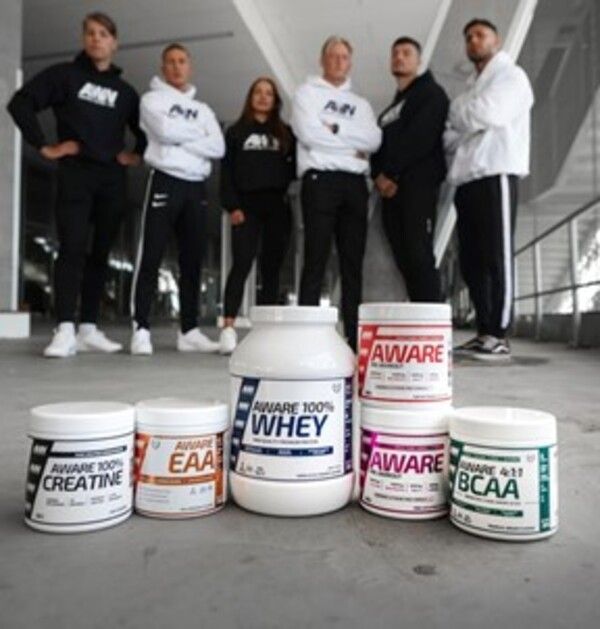
You’d be forgiven for thinking these were a compulsory part of a training program, judging by the popularity of supplement use.
How uninformed are supplement takers?
It’s not just the gym-going public. People are misinformed about supplements of all kinds. It’s just that the misconceptions vary.
A daily supplement for many is a multivitamin. Some of the misconceptions around these involve vague ideas of “wellness”. Others that they are a source of energy and alertness. This “energy” myth persists because people 1) don’t understand the role of macro- and micronutrients in the body, and 2) don’t understand what energy means.
This energy misconception is especially persistent. It has been studied for 30 years, and is seen today even in degree-qualified exercise professionals.
Other people take vitamins to prevent future disease and illness, or use them to counter a perceived inadequate diet. But most of us meet our micronutrient needs through our usual diet. This suggests either a lack of information about the quality of our diets, or overestimating the benefits of a supplement.
What’s the harm?
So what? Why be concerned about a harmless vitamin?
Good question. Even a vitamin supplement is not totally without the potential to harm. For example, taking antioxidants (like vitamins A & E) is associated with earlier death, though the reasons why are not clear.
When deciding on a treatment, medication, or supplement, we need to weigh up the risk against the benefit. Doctors make these decisions all the time. Some benefit, with minimal risk of harm, and we would be happy to go ahead. But no clear benefit, and the same potential for harm, is clearly different.
So for many, a vitamin supplement firstly doesn’t do what we think it does. Secondly, we probably don’t need to take one anyway. And thirdly, it might even cause harm. But we still take them.
Other misconceptions about training supplements
When we look at the athletic and gym-going population, the misconceptions change.
Most common is holding unrealistic expectations of protein supplements. That may explain why they are wildly popular, despite whole foods being the preferred source of protein among experts for safety, nutrient content, and lower cost.
And it’s mostly the less-informed public. In elite sport protein supplements are often only used when whole food is impractical to prepare or transport. In other words, they are “supplemental” to a normal diet, not integral to one.
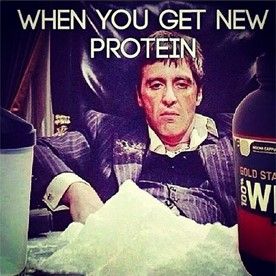
Some gym users and personal trainers get really excited about protein supplements…
There are a range of other supplements claiming to increase training performance and recovery. Some of these have even been shown to have a benefit, but the evidence for much of what lines the walls of a supplement store is lacking.
Sometimes your supplement is not what you think it is
You should also be aware of the quality of what you are taking. Up to one in five off-the-shelf supplements include ingredients that are not listed on the label, but are banned in sport.
If you are subject to drug testing through your sport, that’s a problem.
And it could be a problem for the public too! If you have a heart condition, and are taking a stimulant you aren’t aware of, or at a dose you aren’t aware of, that’s really dangerous.
Athletes test positive due to tainted supplements all the time. At a higher level, when testing is more frequent, the advice is usually: don’t take anything. In my time in professional sport neither strength and conditioning coaches, or dietitians, prescribed any supplements. Approval had to come from the team doctor, regardless of the legal status of the supplement.
So why is your personal trainer?
How popular is training supplement use?
Very popular! It varies between countries, but about a quarter of gym users take some form of training supplement. In the US, about half the adult population takes some sort of dietary supplement.
And among bodybuilders, supplement use is universal, at least according to this small study.

It is a rare bodybuilder that doesn’t take some sort of training or recovery supplement.
Some Swiss research recently aimed to confirm previous findings on supplement popularity. It also looked at the motivations for supplement use, and the sources of training supplement information people used to make their choices.
Who were the participants of this study?
Members of 10 Swiss gyms were surveyed. These gyms represented a range of companies and price ranges. Participants were surveyed at different times of day, and on different days of the week. The goal was to get a representative range of responses.
In total, 417 gym-users took part. Those that revealed their gender were evenly split between men and women. About half were under 30 years old, and about half trained 3-4 times per week.
How common was supplement use in this study?
A whopping 82% reported using at least one supplement, at least once a week. This is far more than the broader Swiss population (about 26%).
This is also more than previous research found, and we aren’t sure why. It could be because Switzerland is a relatively wealthy country, with high disposable incomes. If someone wants to use a supplement, they can more likely afford it.
What training supplements were people taking?
The most popular supplement was protein (43%). This was more common among men (62%) than women (35%), and the average user had 17 serves a week.
Other popular supplements were magnesium (34%) multivitamins (31%), vitamin D (24%), and vitamin C (20%).
Those who trained more frequently generally took more supplements, but this association was quite weak.
One notable idiot reported taking over 100 serves of various training supplements in a week… but only trained once a week! No matter how good your supplement game is, without the right training stimulus, you won’t get the results you want.

All the supplements in the world won’t fix a bad training program.
Why were these people taking so many supplements?
Some were prescribed by a physician, which is appropriate. These are either being used preventatively in a targeted way, or in response to a need.
But most were self-prescribed, or recommended by others. Many took their supplements to “support health”, a vague, catch-all response that people use without really knowing why they are taking something.
However the most common reason cited was for muscle building – explaining the popularity of protein.
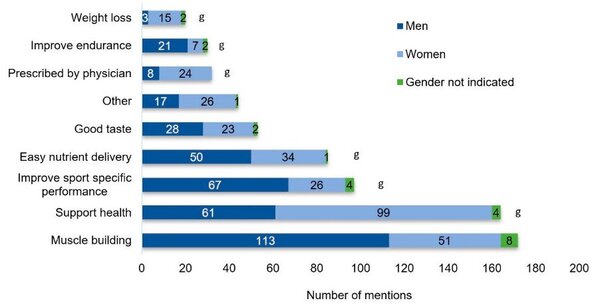
The reasons people gave for using their supplements, reported by Mettler et al., (2020).
What sources of training supplement information did people look to?
We already know that many fitness professionals use unreliable sources of information. So we shouldn’t be surprised to learn the exercising public is also relying on poor sources.
The most cited sources of training supplement information were a trainer (28%), supplement retailer (26%), or training peers (24%).
Some reported that their formal education was their source of information. But only two respondents were a dietitian or physician. The rest were graduates of either sports science qualifications, fitness courses, or took other unspecified courses.
Is this enough? In my experience, no. While a sports science degree is a good start to your education in this area, it is by no means complete. You end up with a superficial understanding of a few basic supplements. A fitness qualification is even more superficial.
Other popular sources were friends and family, or video sharing platforms.
Why did they choose these sources? Some admitted to getting information from people because they were easy to access. Others because of the look or attractiveness of the person providing the information.
But most people chose sources because they wanted scientific, evidence-based information.

People asking trainers for supplement advice say they value qualifications and evidence-based information… give me a minute to process this.
Did you notice the disconnect between these reasons, and the actual sources used? We’ll discuss this more in a minute.
So why aren’t we using dietitians for training supplement information?
If we are going to ask anyone for training supplement information, the most qualified person to ask is a sports dietitian. But even though we want scientific, evidence-based advice, we don’t do it!
Because of the poor sources we use, we are probably not well informed about the risk, or effectiveness, of what we are taking. Which products could have unlisted ingredients? What is effective, and what isn’t? Does your medical history change things? What interactions does the supplement have with other supplements, or medications?
A personal training qualification does not cover this (trust me, I teach nutrition to personal trainers). If they do try to give you advice, they are wildly exceeding their scope of practice, and exposing themselves to legal liability if something goes wrong.
Why do we use such poor sources of training supplement information?
The authors of this study propose two reasons.
First, that people know they are not making the best choices (despite their claim to value quality sources). Instead, they choose based on convenience. Trainers and gym buddies are right there, after all. They are more accessible than dietitians, and cost less.
The second possibility is that people are not capable of telling the difference.
People don’t always know what good evidence looks like. That is why this website exists – there’s a need for a better understanding of good evidence among the exercising public, and fitness professionals, alike.
If someone doesn’t know what high quality evidence looks like, they won’t be able to judge the quality of the evidence they are relying on. So, they make poor decisions.
And if you’ve never met an exercise professional with postgraduate university qualifications, and long experience, you might think a personal trainer is a fitness “expert”. They’re not.
A little education can be a dangerous thing
Those that identified they were educated in supplement use were overwhelmingly not. At least, not to a meaningful level in formal education.
Personal trainers have nutrition training that can be counted in hours, not years. And their scope of practice only covers basic healthy eating advice. And a trainer “doing my own research” doesn’t count – who know what garbage they are reading?!
But in this case, participants rated their education as enough to make informed decisions about supplement use.
This is consistent with the Dunning-Kruger effect. This is a cognitive bias that means we when we are poorly informed about a topic, we tend to overestimate our knowledge.
And those who are highly knowledgeable in a topic tend to underestimate their performance.
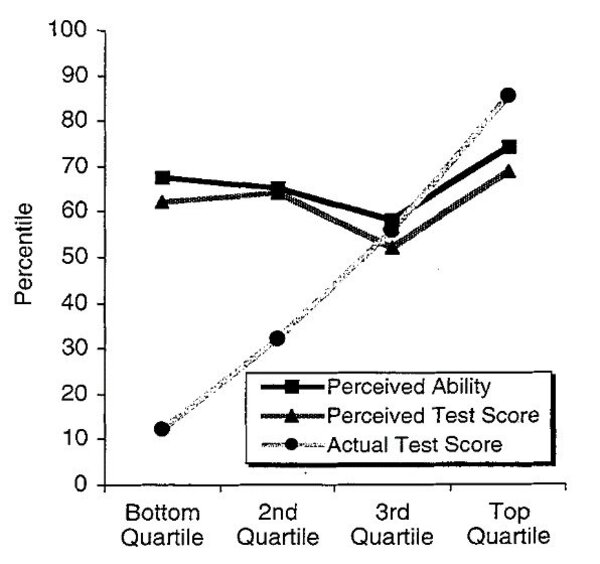
A classic example of the Dunning-Kruger Effect, comparing logical reasoning ability to perceived ability. Those with lower scores significantly overestimated their performance! (Kruger & Dunning, 1999)
The more you learn about a topic, the more you are aware of the complexity within it. There are more shades of grey, and fewer clear answers. You will notice this when you read or listen to academics – they express this uncertainty by choosing the right qualifier for their statement.
But the personal trainer selling supplements? He probably* isn’t expressing a lot of doubt! And he’s probably quite willing to explain exactly how much he knows. But he isn’t aware of the gaps in his knowledge.
But I have one criticism of the paper…
The criticism I have is small, but it’s a chance to discuss some simple statistics, and the importance of accurate writing.
In the abstract the authors state “A high prevalence of supplement intake among Swiss fitness center users was associated with a low level of information quality and a low prevalence of risk information.”
This term, in academic literature, suggests a specific test – a correlation. As supplement use increased, we would need to see a corresponding decrease in the number of high quality sources used.
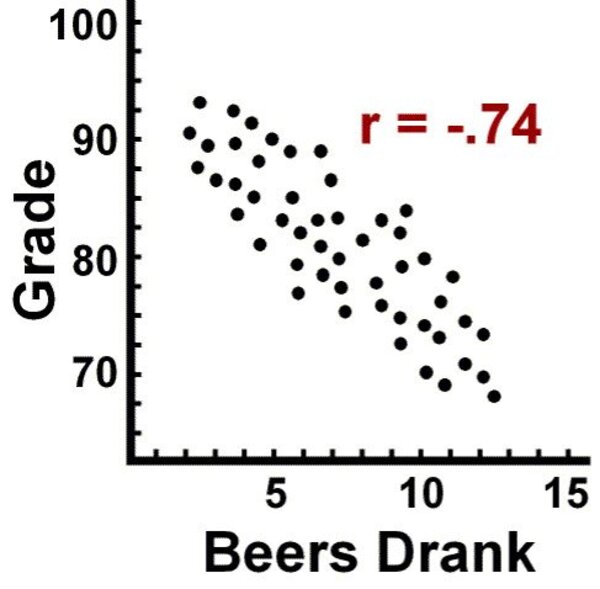
An example of a negative correlation we can all relate to… exam performance dropping as alcohol consumed increases! If you want to find out more about correlation, this is a great resource. This image is by Professor Mark Plonsky, of the University of Wisconsin, and is used with permission.
But they don’t report this test. They identified high levels of supplement use in a gym going population. This same population used low quality sources. But this doesn’t show a correlation between these variables.
It wouldn’t surprise me if there was a correlation, but as the paper didn’t report it, we can’t claim it. But this is a great example of a mistake you could make trying to interpret research without the expertise to do so. This subtlety would probably be missed.
I checked with the lead author, who confirmed that this was their interpretation of the results. They didn’t test for a correlation. **
It’s possible being Swiss, and writing in English, they missed the nuance in the language. Then this was missed in peer review – the publisher of this journal is well-known for fast reviews, so this detail could get missed.
So what do we think about these results?
The popularity of training supplements was confirmed – this was never in doubt.
And the use of poor-quality sources of training supplement information was never in doubt. The real surprise in this study was that people thought they were using high quality sources.
Fitness professionals need to be more aware of what sources they rely on. And they need to be referring to dietitians more.
Dietitians are widely accessible, but not used enough. For the price of one personal training session a client could be getting great advice, from the most qualified professional available. Not half-remembered nonsense from a celebrity trainer on Instagram.
* See? I do it all the time!
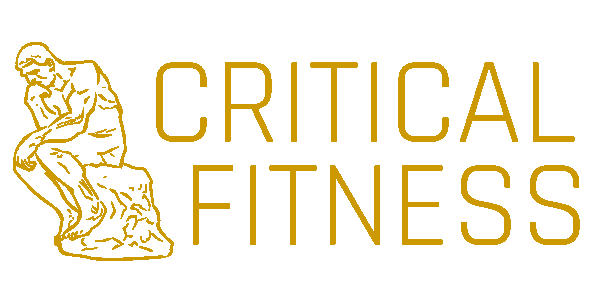
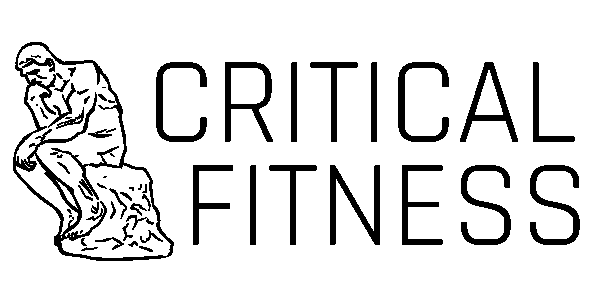

Recent Comments